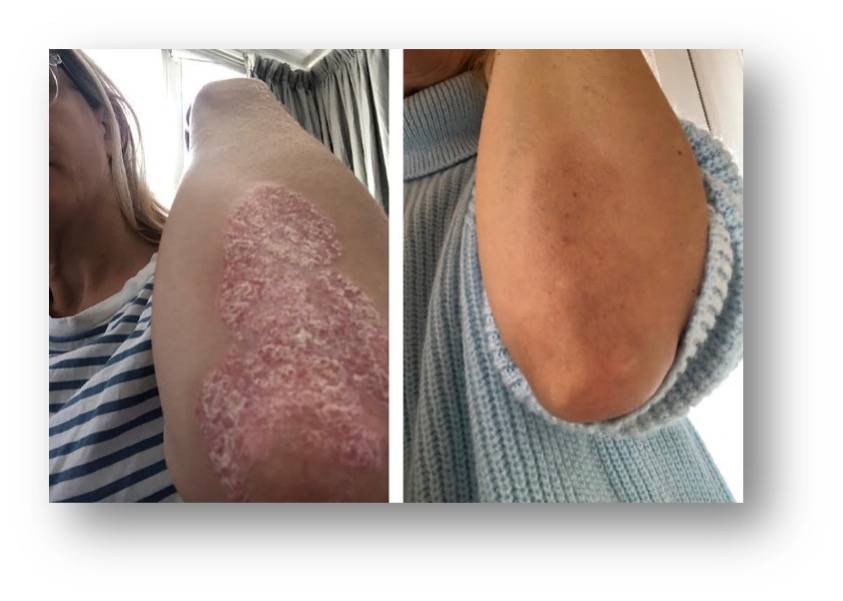TO OUR EU CLIENTS:
Dear Clients, if you are ordering from inside the EU, please order through our Irish site https://www.franklpharma.ie/ to avoid post-Brexit VAT charges. If you are based in the UK, please order as usual through this site. And please accept our apologies for any delays.Ibolya Read
‘I'm such a big fan of this treatment and I want others to enjoy it too

Ibolya Read, 47, managing director of a publishing company, London.
It was 13 years ago, after giving birth to my first child, Ruby, that I noticed my first symptoms of psoriasis. My father had had it all his life - he’s 82 now. He was always covered from top to toe and I felt so sorry for him. He didn't like to go on holidays or expose his skin and so it affected my childhood because it restricted the things he could do with us. It was awful for him.
I hoped I wouldn’t ever get it, but it can be caused by trauma and as I was in labour with Ruby for three and a half days, and that was definitely traumatic, so I think that was the trigger.
I got it really bad over my legs and arms and scalp. It would get better in the summer with the sunshine and fresh air, but then it would come back - in winter it was terrible. I was put on steroid creams and that would make it better for a while, but then it would come back worse, and I found that the steroids thinned my skin, so I decided not to use them.
I like natural products and I tried lots of those, but they didn't work either. I also gave up certain foods and drinks - like milk and dairy - but that didn't improve anything. I just thought I’d have this for the rest of my life.

Ibolya’s elbow before and after using Soratinex
I gave birth to my second child Lucas, 11 years ago. The psoriasis was steady then and not too bad. But an infection can trigger psoriasis as well as trauma, and a while later I believe I had some kind of infection that triggered psoriatic arthritis. My hands and legs swelled up terribly. I used to do yoga and running, but I could barely walk. My psoriasis got really bad and I was put on methotrexate [a chemotherapy and auto-immune suppressant], pills at first, and then the highest dose of injection, and that helped a little with the psoriasis and definitely with the arthritis.
But I had side effects - problems with my kidneys and my hair falling out - and so after two and a half years on the treatment, I decided I wanted to come off it. It was a big decision. I don't want to be too critical of it because I doubt I’d have been able to walk without it, but I decided I’d had enough of it in my body.
The psoriasis got really bad again and I found I was mostly wearing long clothes to cover up my arms and legs. Whenever I got fed up with covering up and wore short-sleeves to the park with the children, adults would stare at me and kids would come up and ask what was wrong with my elbows. It was very awkward.
One day at a party, I got chatting to a guy called Greg [Pittard]*. He noticed my psoriasis and said he’d been on a clinical trial for a treatment called Soratinex that had cleared up his psoriasis. I said I would try it as long as it had no steroids, and so I bought some and gave it a go.
I was amazed. Within a week I noticed my elbows clearing up. I had not changed my diet because I wanted to be sure it was just the Soratinex, and it had to be. There was a dramatic change and my friends and colleagues started noticing it. You can see that my elbows were disgusting and then they got clear. It was a stressful period too - we were moving home - and yet my skin kept on getting better and better.
That was about eight months ago and I’m still mostly clear. There are still some tiny stubborn patches but they are hardly noticeable. I have been so impressed with this and so happy with the results that I tell other psoriasis sufferers about it whenever I can because I want them to experience the same improvement that has happened to me. I have become such a big fan of this treatment that I want others to enjoy it too.
Because psoriasis is in my family, I keep a watchful eye on the children but it’s so comforting to know that Soratinex is there if ever they should need it.
*Greg Pittard was involved in trials conducted by Professor Anthony Chu and Dr Benedetta Brazzini. More details here: https://www.franklpharma.co.uk/article/what-doctors-say-in-uk
